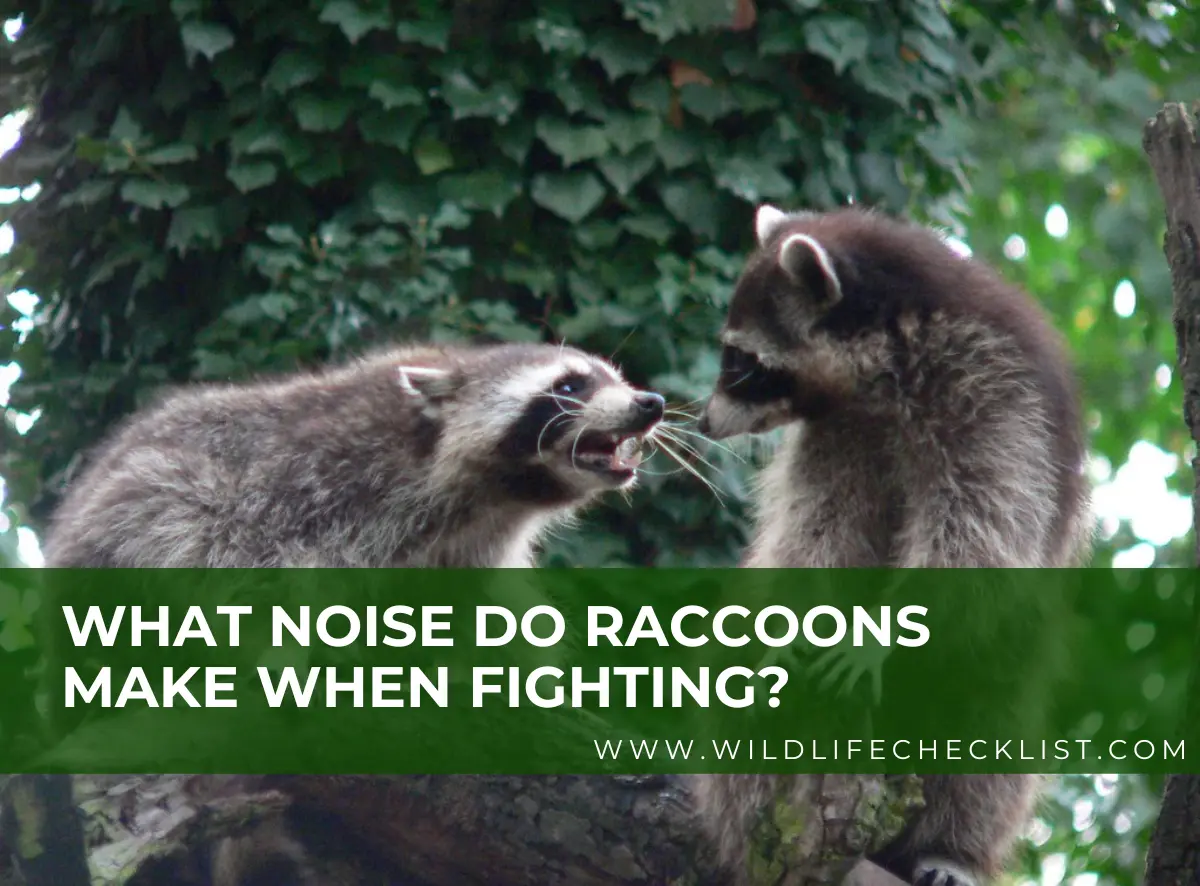Raccoons Fighting Sounds: What Noise Do Raccoons Make When Fighting?

When animals fight, they tend to make sounds, either because of pain or because they are winning the fight. When raccoons fight, too, they make different sounds that have different meanings, but what do the fighting raccoons sound like?
Raccoons make loud and raucous noise while fighting, with whining that precedes three outbursts of loud calls. What do they mean, and how can you identify a raccoon fighting sounds? All these are what will be discussed in this informative piece.
Contents
What Noise Do Raccoons Make When Fighting?
Raccoons are known to make different sounds whenever they are fighting, but the most common one is the growling and hissing sound. This sound is mostly preceded or followed by a whimpering or growling sound, and this is dependent on how the fight is.
@swankskillz raccoons fighting over some garbage. #racoons #wildlife #trashbandits #naturefightclub #fight #cottagelife
Because raccoons are night animals, most of their fights happen at night, and it’s very hard to hear raccoons fight during the day. The black-eyed animal can fight for different reasons, like fighting over food or fighting due to infection with rabies.
Whenever raccoons come together for conflict, it will always escalate into a noisy battle. Since raccoons are notoriously aggressive when they feel threatened, they make different vocalizations and sounds to prove their dominance to one another.
The sounds are majorly growling and hissing to shrill cries, with high-pitched screeches. You will see when a raccoon is fighting and when they are mating because of their sounds.
Why Do Raccoons Fight?
Raccoons are known to be solitary animals, which means they mostly live alone and come together for mating purposes or to share a den during the winter season. But they can occasionally engage in fights for different reasons, and they are:
1. Fight because of territory: raccoons are known to be territorial animals who can protect their territory with everything they have, and they can be fierce about it. Two raccoons meet themselves on another’s territory, and they will surely have a violent and fierce confrontation. Whoever wins gets the territory and starts living there.
2. They fight because of food: remember, raccoons are nocturnal animals, and they are active at night looking for food. When food is scarce, they tend to turn it to fight with other raccoons because of food.
3. When they mate: raccoons are solitary animals, but interestingly, they only meet with other raccoons, especially male and female, when they want to mate. During this process, they are always aggressive, and they fight each other for the chance to mate with the female raccoon.
4. Raccoons fight for dominance: one of the natural things raccoons do is fight on trees, and they often do this to establish dominance and safeguard their territory. They usually use sharp claws and teeth to attack or defend their opponents by pushing them off the tree branch to gain an advantage.
How Do Raccoons Fight?
Raccoons have very sharp claws and teeth that they can use to fight. They will usually try to scratch and bite each other. They will also try to push each other over so they can bite the soft and vulnerable parts of their body, such as the neck or belly.
The fight from raccoons can be intense, which can lead to severe injuries, and it is rare to hear that raccoons fight to the point of death. If you hear loud and aggressive voices like hissing, growling, and arching their backs in your yard, it may be a sign that raccoons are fighting.
Female raccoons tend to be more aggressive and fight when they are protecting their young ones; their fight can be ferocious, as they will protect their little ones by all means.
If a raccoon is infected with rabies, it may display more aggressive behavior, like fighting with other raccoons and biting for no reason. As the fight between them becomes more intense, it can lead to serious injuries.
How To Identify Raccoon Fighting Sounds.
Identifying the sounds of raccoons when they are fighting can be challenging because they tend to make strange noises, which can be misunderstood if care is not taken. If you are hearing some strange noises from your backyard, and you want to be sure it’s a raccoon fight sound, then this is how you can be sure they are fighting.
1. Listen out for growling and hissing sounds: raccoons do growl and hiss when they are angry and feel threatened. So, if you hear any of these sounds, it is an indication that raccoons may be fighting. The growling sounds like a low rumble, and the hissing can sound like a sharp exhale.
2. Pay attention to the intensity of the sounds: the fight between raccoons can be intense, with the animals biting, scratching, and clawing each other. If the sound is loud or aggressive and seems to be escalating with great intensity, then a fight is likely occurring among raccoons in your backyard.
3. Look out for movements and activities: if you hear strange voices and noises coming out from your backyard or nearby woods, take a peep outside if you find two or more raccoons running about aggressively and quickly; they are likely fighting.
4. Be conscious of the time of the day: do not forget that raccoons are mostly night animals, which means most of their activities happen at night, so this tells us that you can only hear their voice or noises at night. So, any strange noises at night could indicate a fight between raccoons. But raccoons can also be active during the day, so don’t rule out the possibility of fighting during the day, but majorly, they are active at night.
5. Investigate with caution: if you notice or suspect that raccoons are fighting, it is vital to investigate with caution because raccoons can be aggressive towards humans. So if they feel threatened or cornered, they can attack you, so if you would like to find out if raccoons are fighting due to different sounds, don’t barge in on them. Be cautious and keep a safe distance to avoid getting close to them.
Do Raccoons Scream In Pain?
Raccoons have different sounds and noises, which include screaming, squealing, growling, screeching, chattering, and purring. According to different wildlife experts, raccoons do scream when they are in pain, protecting their young ones, or when they are scared.
When a raccoon screams, it can be a warning or defensive mechanism for them. Also, raccoons may scream when they are distressed or startled. When there are intense confrontations or experiencing pain or distress, raccoons scream and screech.
It is worth noting that raccoons don’t scream at all times, and their noise or sound is based on different circumstances that surround them, and also what they are trying to communicate at that moment they are making the sound.
Since a fight will cause pain, you will hear raccoons scream whenever they are fighting with each other, but if you see raccoons screeching or snarling, it can indicate that a raccoon is stressed and looking for a safe place it can hide and rest.
What To Do If You Hear Raccoons Fighting In Your Attic
If you have been hearing sounds that indicate raccoons fighting in your attic, it is essential to take action so that you can prevent damages that can come from raccoons on your property and ensure your safety, too.
First, ensure you look for the source of their fighting sounds; this will help you know where to attack when you have identified their sounds in the attic. It sounds like whimpering, shrieking, and growling common to raccoons in the attic.
After you have been able to identify the sounds, contact Wildlife Removal Services; they can help you remove raccoons from your attic. Removing raccoons by yourself is not advisable; they may attack you, and you can be infected with rabies if the raccoon is a carrier.
Also, find a way to seal off every entry point that raccoons can pass into your attic so that they won’t be able to come and also not be able to return. If any damage is done to your attic, ensure you find a way to clean it up and make necessary repairs as well. Clean up feces, urine, and every trace of raccoons to avoid the spread of diseases.
Tips For Preventing Raccoon Fights On Your Property
When raccoons fight, it can cause nuisance to the environment and also endanger both humans and other animals. As house owners who are looking for ways to prevent raccoons from fighting on their property, these are some tips you can follow to achieve that.
1. Ensure your trash cans are secured: make sure that your trash cans are always closed; this is because raccoons are attracted to food sources through their smelling abilities. If your trash cans are always open, you may be inviting raccoons to your yard, and this can cause invasion and can later lead to fights among raccoons because of food and territory. Use a metal trash can instead of the rubber type; it will help you keep raccoons away.
2. Get rid of any possible food source: if you have pets in your house, make sure you don’t always leave their food outside. This can attract raccoons, and through this, you can be calling on raccoon infestation, which will one day lead to a fight among them.
3. Trim the branches of trees around you: raccoons are great climbers and will dwell where they can find a place to live, such as living on a tree. If you cut or trim the trees around you, it will keep raccoons away from coming to your yard.
4. Find a way to close all entry points or holes around: identify any holes or entry points into your property that raccoons can live in. Block all points with wire mesh sheet metal or other durable material that raccoons won’t be able to tear apart.
5. Make use of an electric fence: if you can install an electric fence to your house, it will be one of the most effective options for keeping raccoons away from your house. Using a strip of electrified wires around gardens and properties will scare raccoons off without hurting them so much.
In addition, you can make use of repellants or scents that do affect raccoons. Scents like garlic can repel raccoons.




